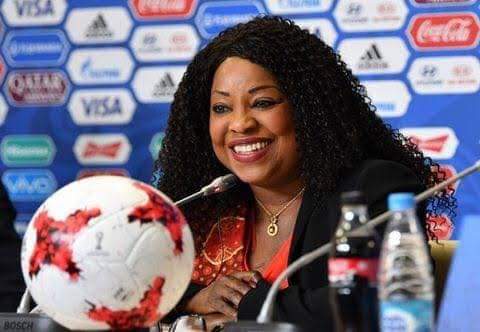Stephen Dunmoye
It has been a debate bubbling away beneath the surface of Nigerian women’s football for some time, with manager Randy Waldrum outspoken in his criticisms over the treatment of his players.
His previous complaints include disagreements over unpaid wages, poor travel arrangements and the cancellation of a pre-tournament camp leading up to the Women’s World Cup in Australia and New Zealand.
The withheld funds caused a stir among the players and almost affected the preparation of the Super Falcons, with many insisting on missing training to protest their unpaid bonuses.
However, the decision came in the wake of unpaid allowance issues faced by the Super Falcons of Nigeria, as some players revealed they were owed per diem and bonuses dating back two years.
Prior to now, FIFA used to send preparation and participating fees to its member federations with players negotiating the percentage they will receive from the money.
The FIFA secretary-general, Fatma Samoura, who visited the Nigerian team, expressed empathy for the team’s hardships and made the revelation to them: “It pains me a lot. It is because of you [the Super Falcons] that, for the first time, the prize money has been ring-fenced in the history of FIFA to ensure that it goes to you.”
As per FIFA’s announcement, every player participating in the World Cup group stage earned $30,000 as match bonuses, and this will increase to $60,000 in the second round of the competition.
The Super Falcons have secured a spot in the round of 16 after finishing second in group B, guaranteeing each team member a minimum of $60,000 for their feat.
Despite the challenges faced due to the outstanding payments, the Falcons have been determined to progress in the competition and will face England in the second-round contest on Monday.
Narrating his ordeal, Waldrum said that the he Nigerian squad even resorted to enlisting the help of global players’ union FIFPRO over the matter.
“I know we are not prepared the way we need to be … I’ve been very frustrated with the federation and the lack of support. “We were supposed to have a camp for 10 to 12 days in Nigeria before going to Australia for another 10 to 15 days, but the federation cancelled the home camp. “We have less days than a College pre-season to prepare for the World Cup, and it blows my mind because we’ve known about this since last year.” His thoughts were unsurprisingly met with disapproval from the NFF.
Federation representative Ademola Olajire called for Waldrum to ‘simply concentrate on the task at hand’.
However, Samoura commended the Super Falcons for progressing at the FIFA Women’s World Cup, a first-ever for an African team at the competition.
According to Samoura, their feat brought joy to women’s football as a whole with their elegance and self-assuredness on the pitch, as well as African women’s football and the African girl-child.
“I must say that I am proud of you. As you know, I am the first woman to be Secretary General of FIFA since the organisation was founded in 1904, and I am also an African. So, I am easily excited by any accomplishment that glorifies women’s football and African football,” she said.
The FIFA scribe who was in company with Nigeria’s leader of the delegation, Chief Felix Anyansi-Agwu and others, described the Super Falcons as the “best team of Africa”.
Samoura said their performance would inspire other African teams at the tournament. “You have won one match here, as Morocco and Zambia, but you are the only team that has made it to the knock-out stage yet. I am also excited because when FIFA President Gianni Infantino announced my name as the new FIFA Secretary-General, I was in Nigeria working for the United Nations. So, Nigeria is a second home for me. “You should continue to believe in yourselves and play as a team, and be ready to lift the African flag higher in this tournament.”
Osasu Obayiuwana, a British-Nigerian journalist, who posted the video on Twitter, noted that Samoura had mandated FIFA’s Director for Africa, Gelson Fernandes, to ensure that the players received $60k entitlement as she would be leaving soon.
Samoura is leaving after seven years as the highest-profile woman working in the world football governing body. However, she will stay in the job through the ongoing Women’s World Cup in Australia and New Zealand and leave at the end of the year.
However, with FIFA’s new direction, players can now focus on their game, knowing that their hard-earned prize money will reach them directly. This move marks a significant step towards ensuring fair treatment and financial security for players in international competitions, setting a precedent for future tournaments.

